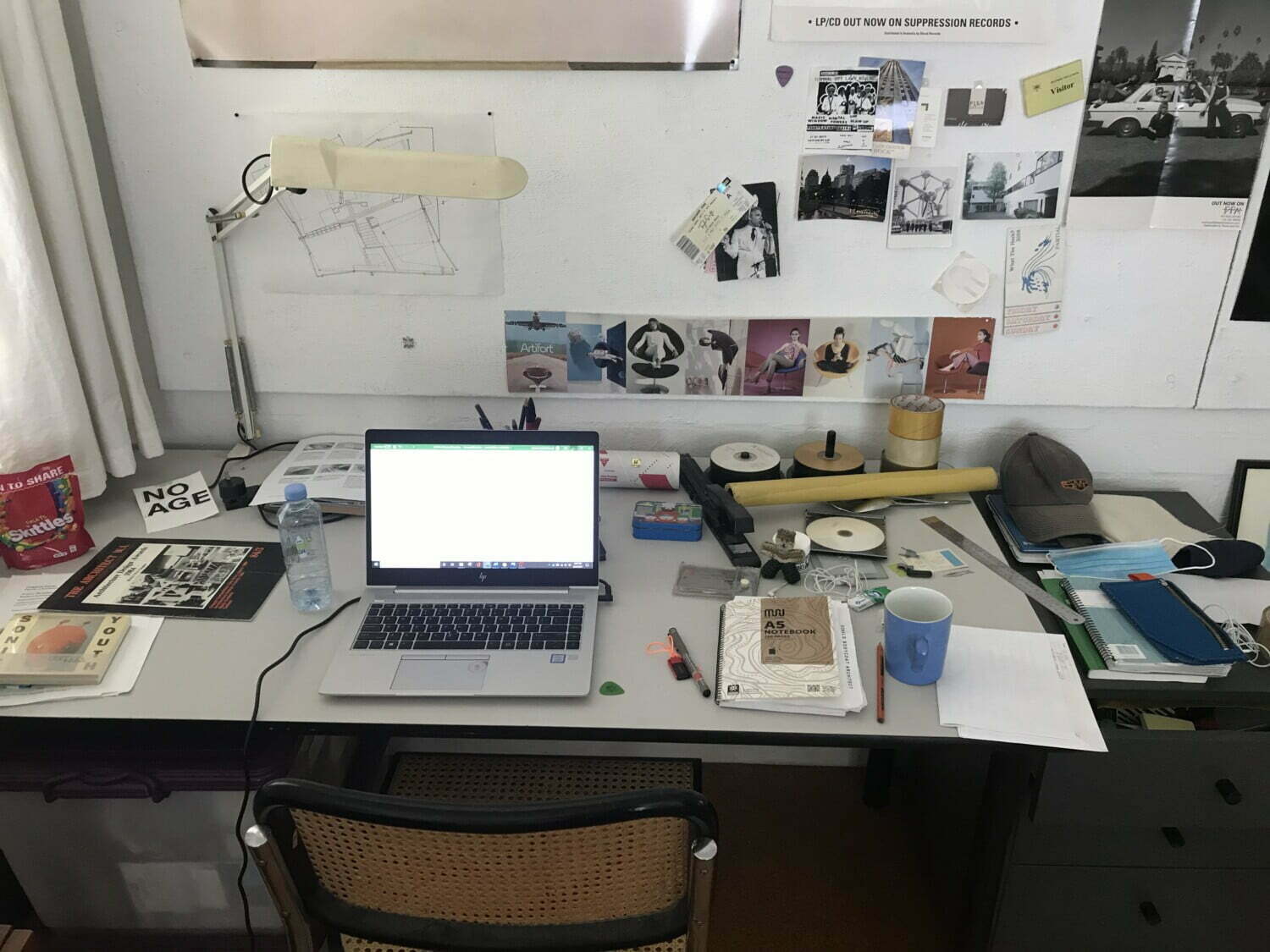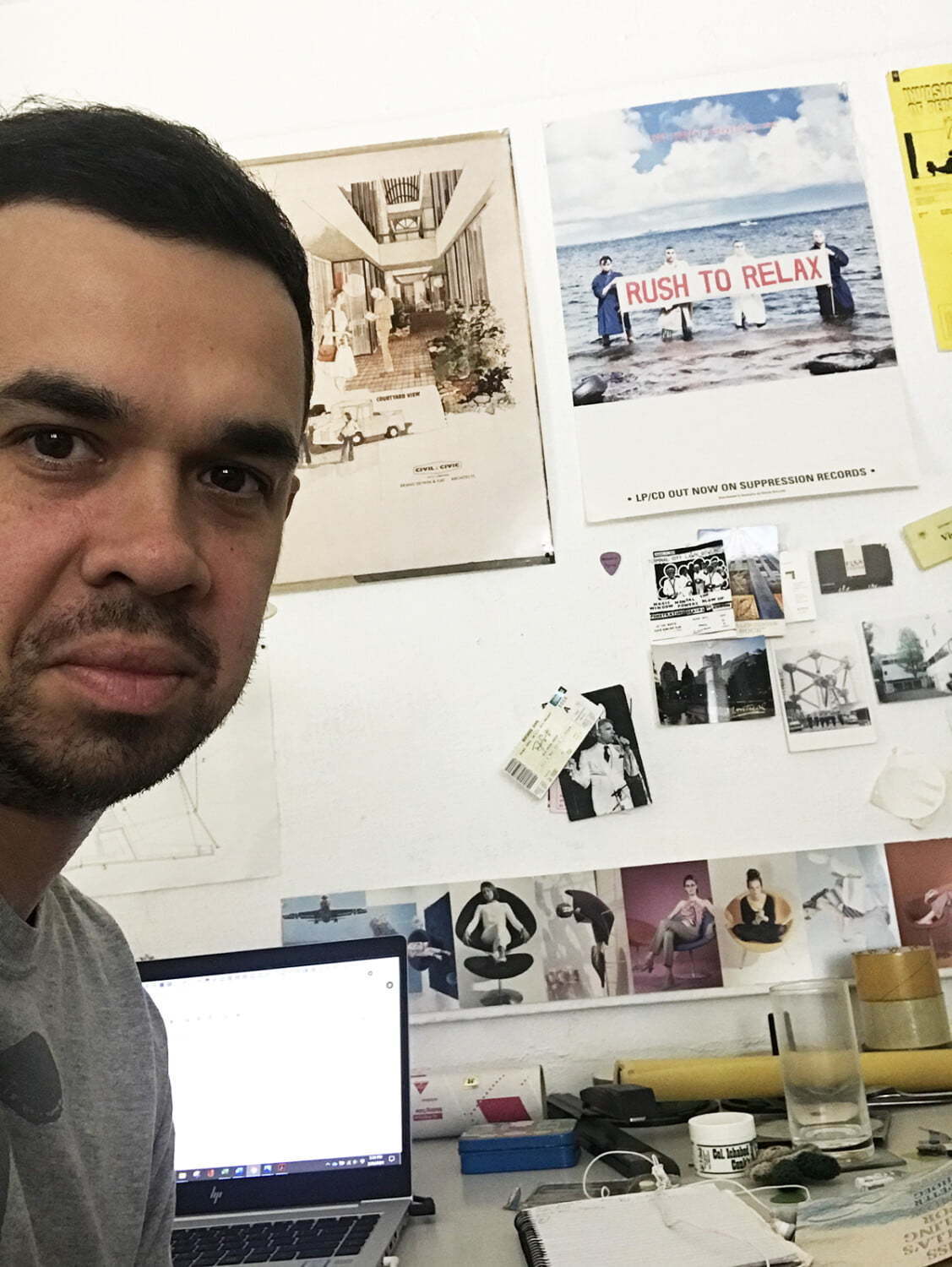Melbourne University PhD candidate Andrew Murray reflects on the challenges and pleasant diversions of his two-week confinement in his childhood bedroom in Perth.

What is your work-from-home space like?
Right now I am working from a desk in my childhood bedroom in Perth, as I undertake the mandatory two weeks quarantine in order to enter the state from my home in Melbourne. My parents built this house in 1985 and I lived here, in the same bedroom, until I was 25 when I moved to Melbourne. The bedroom remains essentially unchanged from when I moved out, apart from a few storage boxes left behind by my sister, which now live under the desk and occupy the corners of the room. The desk is the same one that I have had since I was a teenager. I studied for my year 12 exams and did most of my drafting for my first architecture degree here. This is also where I did all my first editing and freelance writing work more than a decade ago. I am sitting on an old dining chair that we used when I was a kid but has since been relegated to the bedrooms, the woven cane seat cracking as I move. There is a window with a view to the backyard, but mostly the space is cluttered with the colourful ephemera from my youth, which kind of feels like it is now suffocating me. Old movie and band posters, souvenir Taylor Swift concert tickets, piles of old magazines, architectural drawings that I saved from various skip bins and pinned up around the room, and a calendar still open to the month when I left.
What work do you do here?
I am here to do the final part of my fieldwork for my PhD. I was meant to go in the middle of 2020, but the travel bans and border control made it impossible so I have been waiting for an opportunity to go. I had been hoping to travel when there were no quarantine restrictions, but it all got too much, so I took the first opportunity I had to get to Perth. I am here primarily to do a series of oral history interviews with architects who began their practices in the 1950s, as well as looking through their personal archives. I am interested in the culture and the discourses of that period, and am looking to trace the kind of informal, personal networks that enabled this professional community to develop.
I am particularly interested in the fact that so many of these architects went to London for a working holiday in the 1950s, and the importance this trip had on the development of an active practice environment when they returned home. My thesis project looks at the significance of those working holidays and the transformative effect it had on those architects who went over together. I have been fixated on their adventures by boat, car and motorbike as they travelled to London, and the tiny flats they rented in Kensington and Earls Court, dreaming of one day following in their footsteps. Now, in some strange distorted reality, I find myself also in a small room on a working holiday, but rather than being in London, I am stuck in my old bedroom as my parents cook me dinner from a COVID-safe distance.
Did you work from home pre-COVID-19? If so, how has the experience of remote working changed for you in the last few weeks?
After a year of working from the kitchen table, in the last few weeks I had been lucky enough to return to campus and back to my office. There was a sense of normalcy and community that was starting to creep back into life, which was wonderful. To cut that short and find myself back at home, in an even stranger situation than the first time around has been quite a shock. Now I am largely confined to my room, my parents awkwardly leaving food for me as we try and socially distance within a relatively compact house. By now I have developed all the strategies and tools that I needed to work from home, but this still feels very strange. I have been trying to follow a normal working routine – reading, calling people, doing whatever writing I can and arranging meetings for when I get out of quarantine. Going for walks around my room and doing star jumps for exercise. But there is a different distraction this time, different to the year I spent working at home. Now I am surrounded by piles of stuff from my youth. There are endless boxes to sort through, old treasures to discover, along with long forgotten books, toys and travel diaries.
Finding yourself essentially confined to your childhood bedroom for two weeks is not a challenge in a way that last year has been for so many people. Rather, it is a completely absurd situation that feels untethered from any kind of reality. I have been longing to access the personal archives of the people I am studying for the past year, and now I find myself surrounded by my own archive. Endless piles of things to distract me and divert me from work that I should be doing. I kind of love it.
Andrew Murray is a PhD candidate at the University of Melbourne, School of Architecture, Building, Planning and Landscape. His thesis looks at the relationship between Britain and Western Australia and its effect on the architectural culture of Perth in the 1950s. Andrew is currently on the editorial board of Fabrications Journal and has previously been the editor of The Architect WA and The Weather Ring.




















